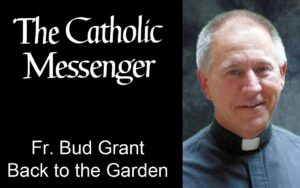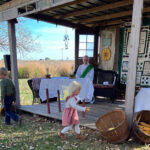By Fr. Bud Grant
We have entered the season of hope-fulfillment. Easter sacraments enhance our awareness of the Resurrection — that life follows death. Moreover, spring is discernibly here. Yet, having all been teased with the false starts and illusory promises that mark all such transitions from gloom to joy, we can be forgiven for a tenacious skepticism, even as massive mounds of snow melt and pastures perk up. Dare we yield to hope?
 Similarly, we may get caught in a binary trap between jaded cynicism and straw-grasping wistfulness concerning new technologies that promise progress in saving the environment. Can we hope while acknowledging that no single technological breakthrough will save us and save the rest of Creation from us?
Similarly, we may get caught in a binary trap between jaded cynicism and straw-grasping wistfulness concerning new technologies that promise progress in saving the environment. Can we hope while acknowledging that no single technological breakthrough will save us and save the rest of Creation from us?
Carbon Dioxide Removal (CDR) technology, essential for addressing global temperatures, works. One Canadian firm pulls in air then filters out the CO2 which is sequestered or used to flush maybe 30 percent more oil from old oil fields. Also, through a series of complex processes, it becomes cost-effective “clean” gas. Not just any gas but gas — that can be pumped for fuel without even modifying our beloved pick-ups. And new jobs come along with new technologies.
Environmentalists, prudent or cynical, are torn about this technology. Will it lull us into a false hope that we no longer have to worry about fuel emissions? Will it just prolong our dependency on toxic oil-based energy? Will a seemingly technological silver bullet just encourage bad habits? The fact that major oil producers are its primary backers suggests two things: it must really work and it must be good for their bottom line.
Wind energy technology has also advanced, producing 30 percent of Iowa’s energy. The rest of the country should catch up within 10-plus years. Turbines have doubled capacity in just two years. Off-shore turbines are coming to the U.S. New turbines have AI (artificial intelligence) so that they can evaluate weather conditions, monitor their own functions and communicate. Corporations are signing on and land owners bank payments.
Some are concerned about the environmental impact, especially on migratory song birds and birds of prey. Losses are highest in California (7.85 birds per turbine per year) and lowest in the Midwest (2.92 birds per turbine per year). Solutions include strategically locating turbines and adjusting their height to stay out of migratory flight paths. Doppler radar is tracking migratory flocks, issuing warnings analogous to weather alerts, which permit turbine operators (or AI) to adjust their speed of rotation to mitigate the threat. Others point out that the real threat to migratory birds is climate change. One note: it is, as Senator Joni Ernst says, “ridiculous” to claim that turbine noise causes cancer or, as a Canadian researcher put it, “annoyance is not a disease.”
On another front, synthetic meat that doesn’t come from an animal is just round the corner. This could reduce impact on the environment, make protein more available and enhance animal welfare. Given that farm and ranch lands are declining even as human population grows, this seems one good option among others, such as reducing waste, vegan and vegetarian diets and the so-called “Impossible Burger” which is made with no animal products and is already being sold by Burger King. Lower in cholesterol, it has, disappointingly, about the same calories as the real thing.
Such “clean” meat’s impact on farming as a way of life is an important unknown. There are other practical unknowns, such as consumer reaction, economic impact and technological capability.
All these fascinating technologies offer us cautious hope that we are increasingly able, and not just willing, to save the planet and leave a richer legacy to our children. It kinda feels like spring. Out of a long Lenten darkness emerges the Paschal light: “a new heaven and a new earth … God’s dwelling with his people … the old order has passed away” (Rev. 21: 1, 3, 4). Dare we yield to such resurrection hope?
(Father Bud Grant is a professor of theology at St. Ambrose University in Davenport.)











